
..........................................................................................................................................................................................................
a few words with tom ritchey

"I'm just one bike ride away from figuring it out."
drummer bill bruford led at least three variations of his jazz group earthworks for a period of almost thirty years, morphing from a band that explored many of the melodic aspects of the new-fangled simmons drums, before settling on the more tried and tested acoustic format for the latter two editions. but you will rarely see his name appended with those particular jazz credentials; more often than not, he is known to the world at large as bill bruford (yes, king crimson).
despite a career of some 41 years prior to his retiral at age 60, bruford is more famous for leaving the progressive rock group yes in 1972, than he is for any other part of his successful career. he departed for the arguably more percussively textural pastures offered by robert fripp's king crimson just as yes released the concept album close to the edge, their fifth album, bringing them into the big time of commercial success.
bruford said that after the oft times traumatic process of recording the album, he couldn't face the rest of his career having to play the piece live. bruford is a drummer i have always admired, not purely for his percussive abilities, but every bit as much for his credibility as a musician, often eschewing the prospect of commercial success in favour of musical integrity. there are not too many who choose the latter option.
bruford has now retired, admitting that he may have fallen out of love with the drums, having commenced his career as a teenager who knew everything and ended as a sixty year-old who knew nothing. it is fairly unusual for any musician to actually retire; the majority simply keep playing for as long as they can physically manage, though it has to be admitted that there are more than a few who should probably have resisted the temptation and faded away gracefully into fondly remembered obscurity.
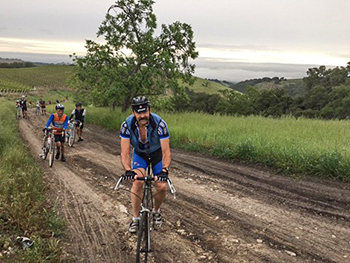
though unrelated to drumming in any way, having reached three score years i have no notion of retiring anytime soon, but then i've scarcely had a career particularly worthy of note. but another gent of far greater notoriety and one sharing my age, despite having packed more into those sixty years than most of us could manage in twice that period, shows little sign of slowing down. he still admits to riding close to 10,000 miles each year in pursuit of his current, self-nominated vocation of one man development department.
tom ritchey was one of the founding fathers of the mountain bike, having been inducted into both the mountain bike hall of fame in crested butte, and the united states bicycle hall of fame in davis, california as well as having won the uci mountain bike world championships and several other major competitions.
while all this transpired, he was building his own company, one responsible for marketing many of his engineering innovations and one that still offers a full range of steel road, mountain and 'cross bikes, a range that pays lip service to carbon fibre via a single model. you'd be forgiven perhaps, for thinking that an accomplished sixty year-old tom ritchey would now be happy to sit back, rest on his laurels and watch the rest of the cycling world roll by. yet he still remains faithful to his own personal mantra "my bike is my office" and that office is still very much in daily use.
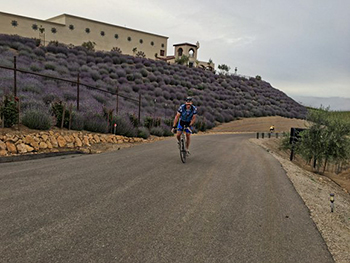
having recently reviewed an excellent pair of ritchey logic offroad pedals attached to a specialized 'cross bike, i did wonder, on the basis that the bicycle has been around for more than just a minute or two and with most of its bits having come under close scrutiny at some time in their lives, where would you even begin to consider how the humble clipless pedal might be improved?
"I consider the pedal one of the most important parts of product development. If you look at my line of pedals, I've tried to keep them low profile and I've made the jumping on and off, mounting, dismounting and reconnecting to the pedal a design goal of mine, so that the pedal is easy to slap your foot on and off. I would say the holy grail is a one-sided mountain bike clipless pedal. All clipless pedals today are two-sided but the need for a rotational momentum to clip in would be done away with if it was one-sided, off-centre and off-axis. I've made prototypes in the past and I've set myself a future goal to learn how to do that.
It's going to require a number of changes which might include doing away with the old 9/16" thread and some other changes. It's a system that I think will come to fruition soon and change a lot of things associated with the standard clipless pedal (a component) which has been around now for about 25-30 years."
but surely there will come a time when everything currently associated with bicycle design will have been refined to the point of redundancy, not to mention the fact that eventually tom ritchey will have to hand over the reigns of his department of one to someone younger, albeit less-experienced. in the light of this, does tom see his role in product development ever coming to a natural end? is it not likely that the law of diminishing returns will eventually come home to roost?

"I would answer that in a number of ways quite carefully. If anything, at 60 years old, I need product development more than anybody. I'm kind of an old-time dinosaur on the bike these days. When I'm trying to keep up with the young guys, I need every possible advantage I can come up with and I'm more motivated by that than anything. The other thing that I think is important is that the older generation that designed components is almost non-existent today. Nowadays they're young, having graduated from engineering college, which is valuable in bringing ideas to production, but they're not always remaining true to simple, classical values. (They need to) value the past, value the heritage, value the shoulders that were stood on in order to get where we are today.
"Having done this for 45 years I've seen, heard and talked to people before me, like Jobst Brandt and my father. Both of them had analysed designs during the 70s and taught me about the reasons for and values of those designs which had reached around 70 years of design evolution. It's a unique position to have in product development.
"But to return to my point, very few of the young bucks arriving on the scene fully understand how we got to where we are now. A lot of them don't factor much of that into what they're doing. So there's always a value to having that deeper history of understanding, experience and miles, allied to any unintended cause and effect of design and what happens in the real world. I now have almost half-a-million miles in my legs and often ride in environments that truly and deliberately push everything to the limit.
"So my riding alone many times into the wilderness, knowing basically that itŐs going to be a long walk home if there's a problem with the part or design, means I have a lot at stake personally. It's a result of the way that I started out and the way that I continue to ride and want to ride in areas that don't have cell phone reception.
"Only a few people would know that I'm missing.
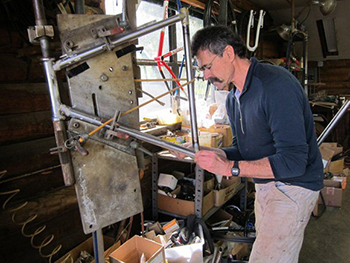
the modern world of the bicycle has all but dispensed with materials such as steel and aluminium. even titanium gets a bit of a raw deal these days, all in favour of what mike burrows once described as "burnt plastic"; carbon fibre. framebuilder richard sachs once said that he continues to work with steel because that is what he knows. if he were starting out today, there's every chance that he'd be more immersed in the carbon world.
however, with only a single carbon frame in the catalogue, tom ritchey has remained faithful to steel, allegedly being the man responsible for the "steel is real" tagline. is there any reason why he's remained faithful to that material and why has that faith not followed through to the forks on his road and 'cross frames?
"If any material has re-emerged without a due amount of understanding, it's steel. Carbon gives you a very wide playing field to organically shape and create structures that will surpass and improve upon formability factors that you could never achieve with steel. The metal is wonderful in a lot of ways, but itŐs got its pluses and its minuses.
"I don't know if you know about the history of Ritchey Logic tubing, but back in the 80s, some 35 or 40 years ago, the formability of steel hadnŐt changed since the turn of the century. When I visited Columbus (tubing) in 1983, they showed me a steel tube that was identical in every way in butting, formability and heat treatment to a spec. sheet from 1899. And when I originally asked them to make Logic tubing, they were unable to do so.
"The formability characteristics, the pushing of the material into more differential, taper and off-centre butting and all kind of things that I asked them to do, no-one had ever tried to do with steel. That was the beginning of the Ritchey steel story with Logic tubing and continued until aluminium and carbon fibre became popular for a lot of reasons, not only in the pursuit of performance and light weight, but basically because manufacturers could have the largest billboard. If you try to put a billboard as big as that on a steel bike, the steel tube would be too heavy.
 "Steel lost a lot of momentum, but now it's back with a lot of new builders who don't know the truth about the material, its diameter equation and formability, plus all the things that went into thinking out of the box with steel. So, if there's ever a reason to continue to play in my sandbox with steel and pushing the material to its limits, it's now.
"Steel lost a lot of momentum, but now it's back with a lot of new builders who don't know the truth about the material, its diameter equation and formability, plus all the things that went into thinking out of the box with steel. So, if there's ever a reason to continue to play in my sandbox with steel and pushing the material to its limits, it's now.
"I enjoy it, and I'm still working on steel forks, with new models coming out, though there are steel forks on some of the current models. But I would also say that because of the characteristics of carbon, the steering column integration with a fork blade is one of the uniquenesses that makes for quite a successful product. But the trade-off that people don't truly appreciate or understand, is that despite less weight and the performance you can get from it, there are some disadvantages; there are pluses and minuses to every product.
"It's always going to be that way. You can't take away weight and add stiffness without consequences. If your goals are a lightweight carbon structure with added aerodynamic features, you're going to give up ride quality characteristics, clearances and things that are very important (such as) the jacking up of the front end. There are all kinds of stories I could tell about the success of my stem, bars and seatpost that are in direct correlation to the growth of aluminium and carbon fibre and how those materials dictated positions on bikes that were taken for granted. For generations of racers and performance riders, (none of) that could be achieved without the selection of stems, bars and posts that kind of fell into my design challenge lap. There's a lot of back story to the use of materials and (their) cause and effect."
it is not, however, just about an impressive number at the bottom of the balance sheet. the bicycle, if you overlook certain aspects of the manufacturing process, has a reputation as a green machine, one which positively encourages social repsonsibility, an aspect of velocipedinal life that has not escaped tom ritchey. take even a quick peek at ritcheylogic.com and there is plain evidence that the company has forged relationships with many bike-related projects such as nemba, plus 3 network, imba etc, but most notably with project rwanda. does tom still maintain close relations with the latter and is all this a means of giving back to a sport that has offered him so much?
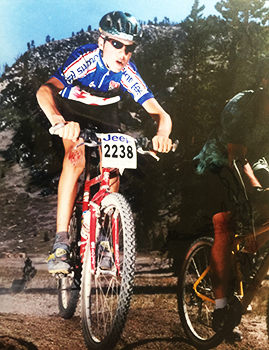
"I do maintain a relationship with (all) the projects. The team (Rwanda) was the first effort that I initiated and invited Jock (Boyer) over along with Alex Stieda. Jock was the one that stayed on, but is now transitioning away from team coach. The picture that I've sent you (right) is kind of a unique story; the current coach of Team Rwanda is Sterling Magnell who I sponsored as a junior and who won the national championships with Team Ritchey in 1995 (heŐs fifteen years old in the photo). Anyway he's now 34 or 35 and went through becoming a professional cyclist and managing a team and now he's living in Rwanda and loves it. I do stay in touch with him and with Jock and I'm very excited to see them continuing."
It is something of a tautology to mention cycling and coffee in the same breath. from the double espressos consumed in the village depart prior to each stage of le tour to the soya cappuccinos consumed after the sunday ride, the beverage and the sport are all but inseparable. Ritchey was the man originally responsible for what came to be known as the coffee bike, a long wheelbase cargo-style bike developed in response to Rwandan coffee farmers needing a more economic yet pragmatic means of transporting their crop. was the latter purely happenstance in its connection with coffee?
"The Coffee Bike Project was something of a coincidence; it turns out that the Texas A&M (an agricultural and mechanical college based in College Station, Texas) people that were in charge of improving the coffee quality in Rwanda when I arrived in 2006, were headed by a cyclist named Tim Schilling. And it was because of him and his background in cycling and his involvement in the country, plus his attendance at the first 'wooden bike classic' in 2007, that he challenged me then and there to develop the coffee bike.
"So Texas A&M and Tim Schilling, along with some help from the government, brought this to fruition and it was subsequently employed as a utility bike for others, such as potato farmers and anyone who needed a human-powered pickup truck at the time."
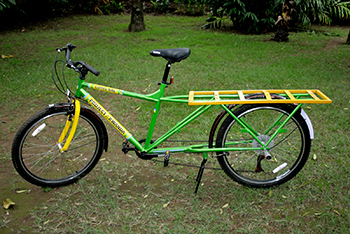
though the coffee bike is of a distinctly utilitarian hue, a brief scan of the ritchey logic website will result only in cycles pertaining to the road, cyclocross or mountain bike disciplines. though it would not be out of the ordinary to utilise any of these for more mundane and less sporting pretensions, it would be stretching credibility a tad too far to consider any of them as sitting at the cutting edge of utilitarian bicycle pragmatism. one of ritchey's co-conspirators in the invention of the original mountain bike was joe breeze, a gent who currently offers an impressive range of practical commuting bicycles. has tom deliberately avoided this particular genre of utlilitarian cycle?
"The length and breadth of specialty that's come into the bike design market is too wide for me to take on everything. I applaud Joe in his efforts and I know that Joe has done likewise to me in the development of the long wheelbase coffee bike.
"However, I think that bike design is based on geography and if you live where I live and you experience the kind of challenges that have to do with adventure cycling in California and places that I like to go, it leads you to designing the kind of products in the Ritchey range. If I'd lived in Holland, in places such as Amsterdam where the utility bike is king, I would probably have developed a product more along those lines."
as tom ritchey pointed out in his introduction, he's now reached the young age of sixty, having achieved an enviable reputation within the cycling industry, amongst his peers and within the cycling community at large. much of contemporary business relies increasingly on plans and consultations, both to guarantee continued investment and to offer a template for the future. thankfully not everyone adheres to this particular modus operandi. in the case of tom ritchey, is there a cunning plan in place, or is it more a case of refining the present rather than wholesale adoption of the future?
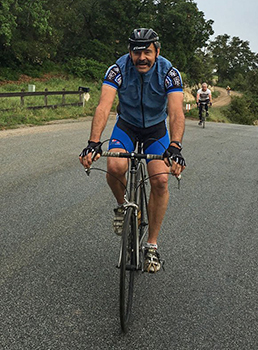
"I'd circle back and basically explain once more that my bike is my office. If you know who I am, you'll know there has never been a cunning plan. There's always been an effort to innovate, though not necessarily invent, on the shoulders of previous wonderful designs that have come to my starting point. I have a need for good product and for good people basically my age who need good product. I'm excited to look into the future and to see how long I can continue to ride a bike in places that I want to ride a bike. In reality I'm just one more bike ride away from figuring it out."
i'd like to thank tom ritchey for the considerable time he gave to answering my questions and for the speed with which he returned the answers. i'd also like to offer my gratitude to ritchey's uk brand manager, simon beatson for his considerable assistance with this feature.
thursday 17 january 2017
 ..........................................................................................................................................................................................................
..........................................................................................................................................................................................................